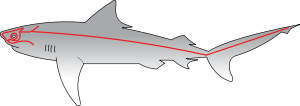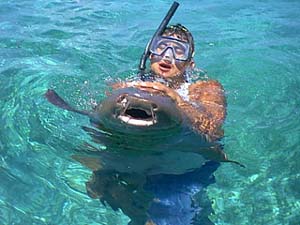Friday, December 24, 2010
UPDATE
just letting you guys know i'll be away for a couple of day, (you know, as it is christmastide and all haha)
Thursday, December 23, 2010
How does a shark breathe?
As with other fishes, sharks breathe by extracting oxygen when seawater passes through their gills.
Shark gills are just behind a sharks head and they are not specially covered, like in most fish.
Water pass thorough their gills while sharks are swimming making impossible for most of them to stay still as otherwise they would drown. This process is called ram ventilation.
As with other fishes, sharks breathe by extracting oxygen when seawater passes through their gills.
Shark gills are just behind a sharks head and they are not specially covered, like in most fish.
Water pass thorough their gills while sharks are swimming making impossible for most of them to stay still as otherwise they would drown. This process is called ram ventilation.
Tuesday, December 21, 2010
Shark FAQ 7
How do sharks know when something is food or not?
Studies have proved that shark senses are fully responsible for shark hunting.
They commonly use the electrosense for location, even at long distances.
The lateral line sense detects water vibrations usual to most living things.(see left)
The smell and hearing are also used for confirmation, leaving the sight sense the last check when a prey is going to be hunt.
After all these sensorial scanning, sharks sometime even test their food if it is not familiar for them.
Studies have proved that shark senses are fully responsible for shark hunting.
They commonly use the electrosense for location, even at long distances.
The lateral line sense detects water vibrations usual to most living things.(see left)
The smell and hearing are also used for confirmation, leaving the sight sense the last check when a prey is going to be hunt.
After all these sensorial scanning, sharks sometime even test their food if it is not familiar for them.
Monday, December 20, 2010
Shark FAQ 6
How do sharks find their food?
Sharks are provided with several extraordinary senses that help them find their prey.
This developed and accurate senses has made them very successful for 400 million years.
Usually they use their electrosense system to find prey from long distances.
Then when they are close, smell, hearing and visual senses are used for verifying that the prey is fine for food.
Great White Sharks can smell blood from 1kilometre off, now that's scary!
Sharks are provided with several extraordinary senses that help them find their prey.
This developed and accurate senses has made them very successful for 400 million years.
Usually they use their electrosense system to find prey from long distances.
Then when they are close, smell, hearing and visual senses are used for verifying that the prey is fine for food.
Great White Sharks can smell blood from 1kilometre off, now that's scary!
Sunday, December 19, 2010
Shark FAQ 5
How do sharks communicate?
There is not solid evidence on how sharks communicate, however there is a great belief that the extraordinary senses developed by sharks are involved in any communication between sharks, if any.
There is not solid evidence on how sharks communicate, however there is a great belief that the extraordinary senses developed by sharks are involved in any communication between sharks, if any.
Friday, December 17, 2010
Shark FAQ 4
Now, this post is not for the youngin's so if you don't want to know how sharks mate, don't read this!
How do sharks breed?
While some species breed differently.
Mating in sharks has been rarely observed (so no picture for all you perverts), but most species do it while they swim parallel to each other and the male inserts a clasper into female's oviduct.
There are three ways in which shark pups are born:
Oviparity.
Sharks lay eggs.
Viviparity
Sharks have placental links with developing pups. Pups born fully functional.
Ovoviviparity
Method used by most shark species.
Eggs develop inside the oviduct and hatch inside the oviduct where it finishes its development. Pups born fully functional.
How do sharks breed?
While some species breed differently.
Mating in sharks has been rarely observed (so no picture for all you perverts), but most species do it while they swim parallel to each other and the male inserts a clasper into female's oviduct.
There are three ways in which shark pups are born:
Oviparity.
Sharks lay eggs.
Viviparity
Sharks have placental links with developing pups. Pups born fully functional.
Ovoviviparity
Method used by most shark species.
Eggs develop inside the oviduct and hatch inside the oviduct where it finishes its development. Pups born fully functional.
Thursday, December 16, 2010
Shark FAQ 3
How big is the Shark Brain?
While brain size cannot be generalized to every shark species, some of them have a Y shaped brain with two bulbs, measuring about 2 feet (60 centimeters)
Some writers have said that the shark brain is the size of a golf ball, but this is not accurate.
The brain mass to body mass ratio in sharks is much lower than humans, but a very good ratio even compared with some mammals.
In general, sharks have complex brains.
While brain size cannot be generalized to every shark species, some of them have a Y shaped brain with two bulbs, measuring about 2 feet (60 centimeters)
Some writers have said that the shark brain is the size of a golf ball, but this is not accurate.
The brain mass to body mass ratio in sharks is much lower than humans, but a very good ratio even compared with some mammals.
In general, sharks have complex brains.
Wednesday, December 15, 2010
Shark FAQ 2
How big is the biggest recorded Whale Shark?
The Guinness Book of Records has the Worlds Largest fish (a Whale Shark) recorded as 12.65 metres which is 41 feet 6 inches.
However, there are versions that whale sharks could reach 60 feet, but they are not scientifically recorded.
The Guinness Book of Records has the Worlds Largest fish (a Whale Shark) recorded as 12.65 metres which is 41 feet 6 inches.
However, there are versions that whale sharks could reach 60 feet, but they are not scientifically recorded.
Tuesday, December 14, 2010
Shark FAQ 1
How are Whale Sharks endangered?
The whale shark is targeted by commercial and artisan fisheries. This has put them in the list of endangered species.
Although the worldwide population is unknown, the reduction in sightings have put them in a vulnerable situation.
The whale shark is targeted by commercial and artisan fisheries. This has put them in the list of endangered species.
Although the worldwide population is unknown, the reduction in sightings have put them in a vulnerable situation.
hey guys, thanks for all your support.
i was thinking of letting you, my followers and commenters decide, my content.
Should I:
(A) keep doing individual profiles
(B) have shark FAQ's (there pretty interesting)
just keep in mind, that I have already done a lot of profiles, and I am starting to run low :D
i was thinking of letting you, my followers and commenters decide, my content.
Should I:
(A) keep doing individual profiles
(B) have shark FAQ's (there pretty interesting)
just keep in mind, that I have already done a lot of profiles, and I am starting to run low :D
Sunday, December 12, 2010
BLUE SHARK:
Blue sharks are about 12 feet long.
they have an extremely sleek and tapered body, and due to this body structure, they are among the fastest swimming sharks and can even leap out of the water.
their diet consists mostly of squid, but it will eat almost anything.
be warned - considered dangerous - have attacked people.
Friday, December 10, 2010
Thursday, December 9, 2010
Wednesday, December 8, 2010
GOBLIN SHARK
they are very, very uncommon and likely the strangest looking shark (rarely seen)
it has pale, pinkish grey skin with a long pointed snout (it looks a bit like a sword on top of its head)
it is so rarely seen because it lives in very deep water.
it is so elusive until it was found off the coast of Japan in 1898... until that time it was believed to have been extinct for 100 million years
i would have a picture, but it is so rare that there aren't any :\
i would have a picture, but it is so rare that there aren't any :\
Tuesday, December 7, 2010
Monday, December 6, 2010
Sunday, December 5, 2010
Saturday, December 4, 2010
sharks for you!
ANGEL SHARK
flat body like a stingray -- you can tell the shark is not a ray because the pectoral fins are not attached to the head.
They bury themselves in the sand or mud with only the eyes and part of the top of the body exposed.
They are bottom feeders, eating crustaceans like clams and mollusks and fish that are swimming close to the ocean floor
Wednesday, December 1, 2010
weird shark
Epaulet shark walks along the bottom with it’s fins and it can survive out of water for short periods.
Subscribe to:
Comments (Atom)












